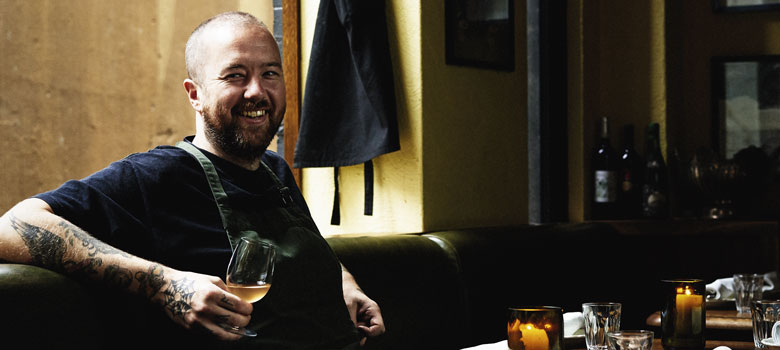
Food
Dan Pepperell - Becoming A Mentor
Having earned his stripes in some of Australia's most famous kitchens, being mentored by the greats, Dan Pepperell has shaped a mentoring style of his own.
For over a decade, Australia has been gripped by restaurant fever: the television shows, the magazines, the cooking classes and the cookbooks. Never before have we been so focussed on the world hidden behind a swinging door.
What is it about this workplace that holds so much interest? Is it the unusual combination of military precision and creativity? Or is it the yelling, the heat, the intensity?
In all the time I have been writing about life in these kitchens, the one thing that continues to strike me most is the family, the friendships. While the hours, the work environment and often the pay, are far from enviable, there is a camaraderie you don’t find elsewhere.
As with most trades, this is work you learn while on your feet, from the people standing next to you. You must train your hands to work before you can allow your mind to do the heavy lifting. You steal with your eyes. But, above all, it’s a team sport. You are always learning from those above you and teaching those below you. This is a workplace built for mentors and mentees.
It’s for this reason a chef’s resume counts for so much. The people, the influences, the mentors, all shape the chef to come. It’s a question of finding the people you want to emulate, or them finding you.
opening doors
For a young Dan Pepperell, executive chef at Sydney’s Alberto’s restaurant, it was a photo, a bit of a joke, that got him through that first swinging door. “I was working as a dishwasher in Cronulla when I saw an ad in the paper (it was where you looked back then!) Tetsuya was advertising. I didn’t know what Tetsuya was. ‘Must be committed,’ the ad said.”
Pepperell sent in a photo of himself as a boy, making sushi with his dad’s friend. When he got the job, Martin Benn (who was head chef at the time – and went on to own and run Sydney’s three-hatted Sepia), said the only reason he gave him the job was that photo.
For two years he worked under Benn, cooking alongside a gaggle of chefs who now run many of Australia’s best restaurants. When Pepperell left (“It was Martin who opened doors for me,”) it was to trade places with Dan Hong [Mr Wong] and take on a role in Mark Best’s Marque kitchen.
hitting the marque
Like Tetsuya’s, Marque was degustation focused and fine-dining, yet instead of a brigade in the kitchen, there were three or four. “I remember in the early days at Marque I picked up some tongs out of the bain marie and stuck them straight into the deep fryer. Of course, it exploded, but the surprise to me was more about what I didn’t know – I realised I had done no cooking at that stage.”
Mark Best’s cuisine was highly creative and yet held to strict standards in the kitchen, largely by head chef Pasi [Petnanen, now chef/owner of newly opened hot-spot Café Paci]. “I learnt a lot about cooking and pastry. Pasi was strict and work was pretty intense. I was terrified of him, but he taught me a lot!”
The kitchen was small but full of talent, chefs that remain friends and mentors to this day. “Karl [Furler, later chef and owner at Oscillate Wildly] was also an awesome mentor, he was very patient. He taught me to bake bread, temper chocolate, the classic pastry skills.”
Alongside the shifting techniques, there were shifting styles of leadership. “Martin was the first to give me a chance, but he was hard on me as well. He never said hello; years later he told me it was because he knew I could get somewhere,” says Pepperell. “Mark was a great mentor, but more like a father figure, you could talk to him about things. He liked hanging in the restaurant, you could talk about your weekend, your girlfriend, it wasn’t just about food.”
a diverse path
From Tetsuya’s onwards, Pepperell’s resume could be used to chart some of the most important restaurants and culinary movements of the past decade. From Marque to Attica, from Sydney’s Lotus and Oscillate Wildly to Dave Chang’s Momofuku Ssam in New York and back to Sydney with Paddington’s 10 William Street, Hubert’s and now Alberto’s.
In that trajectory, Pepperell covered traditional degustation fine dining, experimental fine dining, native Australian, ingredient focussed, casual settings with complex food, wine with food, food with jazz and now traditional, nonna-like simplicity. Those trends and waves have been much enjoyed by Pepperell: “Learning to cook in Australia, everyone does it to an extent, we can cook basically anything! I loved when it was foams and weird, whacky techniques – it was all about being interesting and playful. Right now, I love old bistros, old trattorias, as simple as it gets.”
As the culinary ideas have changed, so too has the role of head chef and mentor. “Before a lot of it was achieved through fear. It does work, I just don’t think it gets good results, it’s not a good environment to come into,” says Pepperell. His management style is a mélange of all that came before, “I try to have everyone in a good mood, I still have a high standard, I still need to have that strictness where it matters. But, I’m not going for the three hats, there’s no yelling or screaming. There are so many jobs, if someone’s not happy, they leave, before it was hard to get a job at Marque, now everyone needs a chef. You have to keep people happy.”